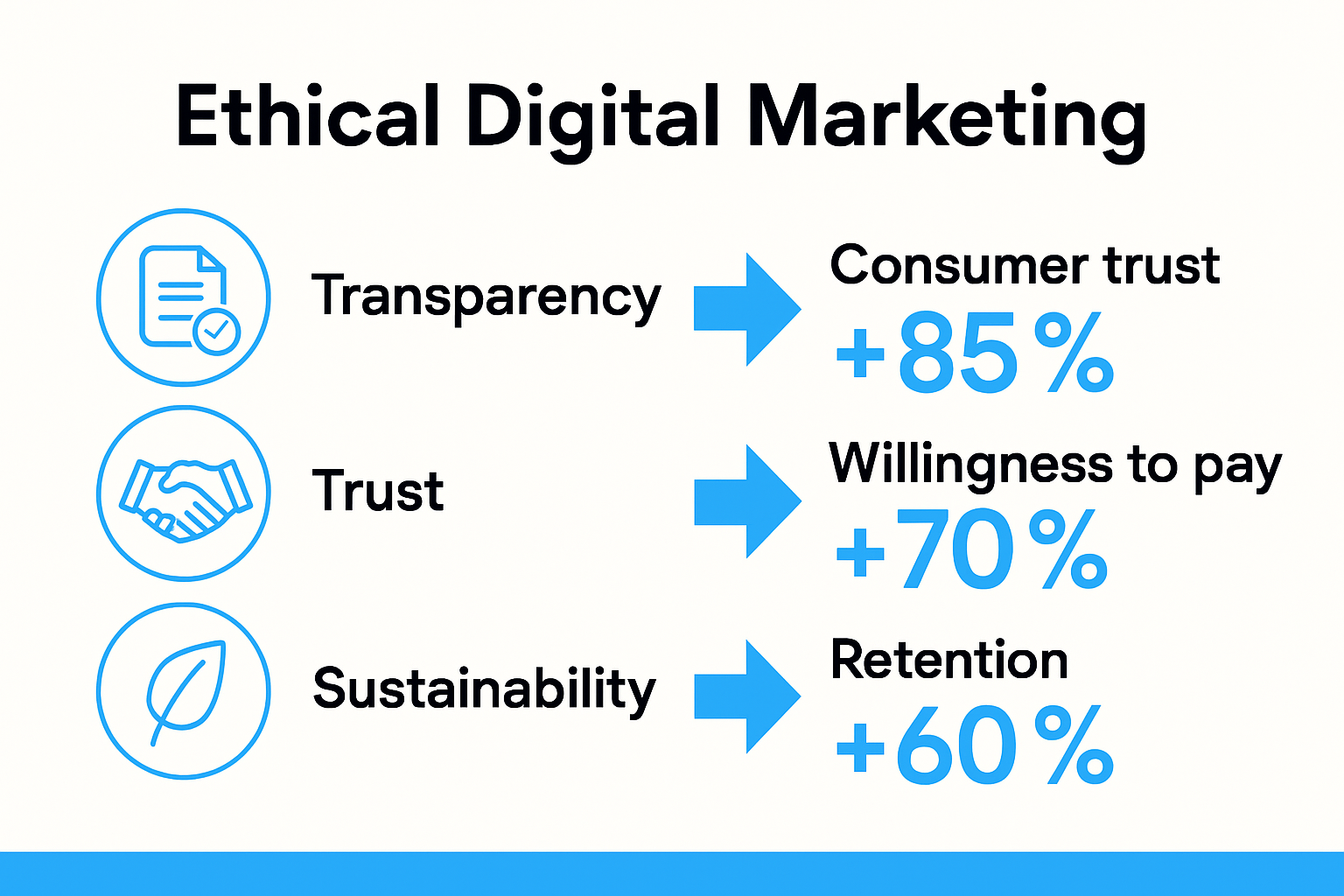Ethical digital marketing is taking centre stage for businesses in 2025. More people are asking whether the brands they support are transparent or just paying lip service. But check this. A staggering 87 percent of consumers are willing to pay more for products from companies with a strong ethical reputation. Turns out, being truly ethical is not just about good intentions or ticking boxes. It is now the key that separates thriving brands from those fading into the background.
Table of Contents
- Why Ethical Digital Marketing Matters Today
- Key Principles Of Ethical Online Engagement
- Practical Steps For Building Ethical Campaigns
- Adapting Ethical Strategies For Business Growth
Quick Summary
| Takeaway | Explanation |
|---|---|
| Ethical marketing fosters consumer trust. | Prioritizing transparency and data privacy enhances customer loyalty and retention significantly. |
| Consumers value genuine ethical practices. | Modern buyers seek brands demonstrating strong moral standards, shaping purchasing decisions. |
| Cultural inclusivity enhances brand image. | Authentic representation in marketing communications resonates with diverse audiences, promoting inclusivity. |
| Sustainability drives consumer preference. | Ethical businesses engaging in sustainable practices attract more loyal customers willing to pay a premium. |
| Transparency boosts competitive advantage. | Open communication about business practices encourages consumer trust and differentiates companies in a crowded market. |
Why Ethical Digital Marketing Matters Today
The digital marketing landscape is rapidly transforming, with ethical considerations becoming a critical cornerstone for businesses seeking sustainable success. Modern consumers are no longer passive recipients of marketing messages but active participants who demand transparency, respect, and genuine value from the brands they engage with.
The Rising Consumer Consciousness
Today’s digital consumers have unprecedented access to information and are increasingly sophisticated in their understanding of marketing practices. Research from Deloitte reveals that 63% of consumers prefer to purchase from companies that demonstrate strong ethical standards. This shift represents more than a trend - it’s a fundamental reimagining of the relationship between businesses and their audiences.
The pandemic has accelerated this ethical awakening, with consumers becoming more discerning about the values and practices of the brands they support. They are looking beyond product features and pricing, examining the deeper ethical implications of their purchasing decisions. Businesses that fail to recognise this fundamental transformation risk becoming irrelevant in a market that increasingly values authenticity and social responsibility.
Data Privacy and Consumer Trust
Ethical digital marketing is no longer optional - it’s a strategic imperative. Harvard Business Review research highlights that companies with robust data privacy practices experience 20% higher customer loyalty and retention rates. This means ethical marketing is not just a moral imperative but a significant competitive advantage.
Consumers are increasingly aware of how their personal data is collected, used, and shared. They demand granular control over their digital footprint and expect businesses to be transparent about their data management practices. This requires a fundamental shift from traditional, invasive marketing approaches to more respectful, consent-based strategies that prioritise individual privacy and autonomy.
The Business Case for Ethical Marketing
Beyond moral considerations, ethical digital marketing offers tangible business benefits. Companies that develop comprehensive ethical marketing strategies can differentiate themselves in a crowded marketplace, build deeper customer relationships, and create long-term brand loyalty.
This approach involves more than avoiding unethical practices. It requires proactively developing marketing strategies that are transparent, inclusive, and genuinely value-driven. Businesses must move beyond performative ethics and demonstrate a genuine commitment to responsible digital engagement.
The future of digital marketing belongs to those who understand that trust is the most valuable currency. By prioritising ethical practices, businesses can transform marketing from a transactional interaction into a meaningful dialogue that respects and empowers consumers.
The message is clear: ethical digital marketing is not a luxury or a compliance checkbox. It is the foundation of sustainable business growth in an increasingly connected and conscious digital ecosystem.

Key Principles of Ethical Online Engagement
Ethical digital marketing requires a comprehensive approach that goes beyond superficial compliance, demanding genuine commitment to principles that respect consumer autonomy, privacy, and human dignity. As digital platforms become increasingly complex, businesses must develop robust frameworks for responsible online engagement.
Transparency and Consent
Research from Matomo highlights that transparent data practices are no longer optional but essential for maintaining consumer trust. This means providing clear, accessible information about data collection processes, offering granular consent mechanisms, and allowing users complete control over their personal information.
Companies must implement straightforward opt-in and opt-out processes that are easy to understand. Complex legal language and hidden clauses undermine consumer trust and represent unethical marketing practices. The goal is creating an environment where users feel empowered and respected, not manipulated.
Cultural Sensitivity and Inclusive Representation
Ethical online engagement demands a nuanced understanding of diverse audience experiences. Forbes Agency Council research emphasizes that marketing strategies must move beyond tokenistic representation towards genuine inclusivity.
This principle requires businesses to:
- Represent diverse perspectives authentically
- Avoid stereotypical or discriminatory imagery
- Create content that resonates with multiple cultural contexts
- Demonstrate genuine commitment to social equity
Marketing communications should reflect the rich tapestry of human experience, acknowledging different backgrounds, abilities, and identities without reducing them to simplistic narratives.
Sustainability and Social Responsibility
Ethical digital marketing extends beyond immediate commercial objectives. Ethical Marketer Organisation suggests that modern businesses must align their marketing strategies with broader social and environmental goals.
This involves:
- Communicating genuine sustainability efforts
- Supporting meaningful social causes
- Demonstrating environmental consciousness
- Creating value beyond product sales
Businesses that develop comprehensive ethical marketing strategies understand that consumers increasingly evaluate brands based on their broader societal impact. Marketing is no longer just about selling products but about contributing positively to collective human experience.
The future of digital marketing lies in recognising that ethical engagement is not a constraint but an opportunity for deeper, more meaningful connections with consumers. By prioritising transparency, inclusivity, and social responsibility, businesses can transform marketing from a transactional process into a platform for genuine human understanding and collaborative progress.
To help readers quickly compare the three main principles of ethical online engagement, here is a table summarising their definitions and key actions for businesses:
| Principle | Definition | Key Actions for Businesses |
|---|---|---|
| Transparency & Consent | Being open about data practices and gaining user consent | Clear privacy policies, easy opt-in/out, user control |
| Cultural Sensitivity & Inclusivity | Authentic representation and respect for all cultures | Diverse imagery, reject stereotypes, inclusive content |
| Sustainability & Social Responsibility | Aligning with broader social/environmental goals | Support causes, real sustainability messaging, beyond products |
Practical Steps for Building Ethical Campaigns
Building ethical digital marketing campaigns requires a strategic and holistic approach that goes beyond mere compliance. It demands a comprehensive framework that integrates transparency, respect, and genuine value creation for consumers.
Data Privacy and Consent Management
Research from ResearchGate highlights the critical importance of robust data privacy practices in modern digital marketing. Businesses must implement comprehensive consent management systems that provide users with clear, granular control over their personal information.
Key strategies include:
- Implementing transparent data collection processes
- Providing easy opt-out mechanisms
- Creating clear, understandable privacy policies
- Minimising data collection to essential requirements
Companies should view data privacy not as a regulatory burden but as an opportunity to build trust and demonstrate respect for consumer autonomy.
Authentic and Responsible Targeting
Ethical marketing research emphasizes the need to move beyond invasive targeting practices. Modern ethical campaigns focus on creating genuine value for consumers rather than manipulative engagement strategies.
This approach involves:
- Developing audience personas based on genuine consumer insights
- Avoiding discriminatory or exploitative targeting
- Creating content that genuinely serves user needs
- Respecting individual privacy boundaries
Effective targeting is about understanding and serving consumer needs, not exploiting psychological vulnerabilities. Build brand credibility by demonstrating a genuine commitment to consumer well-being.
Ethical AI and Marketing Technology
Systematic research on people analytics reveals the growing importance of ethical considerations in marketing technology. As artificial intelligence and machine learning become more prevalent, businesses must prioritize responsible implementation.
Practical steps include:
- Ensuring algorithmic transparency
- Implementing fairness checks in AI systems
- Regular audits of marketing technology
- Creating human oversight mechanisms
Ethical AI in marketing is not about avoiding technology but about using it responsibly. This means developing systems that enhance user experience while protecting individual rights and preventing unintended discriminatory outcomes.
The future of digital marketing lies in creating campaigns that are not just effective but fundamentally respectful. By prioritizing ethical considerations, businesses can build deeper, more meaningful connections with their audiences. This approach transforms marketing from a transactional interaction to a collaborative dialogue that values human dignity and individual autonomy.
True ethical digital marketing is about recognising that behind every data point, every click, and every interaction, there is a human being deserving of respect, privacy, and genuine value.
The major steps for building ethical campaigns can be summarised in the following table for easy reference:
| Step | Purpose | Example Action |
|---|---|---|
| Data Privacy & Consent Management | Safeguard user data and autonomy | Clear policies, transparent data handling |
| Authentic & Responsible Targeting | Serve users and avoid exploitation | Personas based on insights, avoid manipulation |
| Ethical AI & Tech Use | Responsible use of new tools | Algorithm audits, fairness checks, human oversight |
Adapting Ethical Strategies for Business Growth
In the evolving digital marketplace, ethical strategies are no longer a peripheral consideration but a fundamental driver of sustainable business growth. Companies that successfully integrate ethical principles into their core business model can unlock unprecedented opportunities for expansion and customer loyalty.
Transparency as a Competitive Advantage
Research from Agility PR Solutions emphasizes that transparency is a foundational element of modern business success. By cultivating open and honest communication, businesses can differentiate themselves in an increasingly crowded digital landscape.
Key strategies for leveraging transparency include:
- Providing clear, accessible information about business practices
- Openly communicating product origins and manufacturing processes
- Sharing genuine insights into company values and decision making
- Maintaining consistent and truthful messaging across all platforms
Transparency transforms potential consumer skepticism into trust, creating a powerful competitive edge that goes beyond traditional marketing tactics.
Sustainable Value Creation
PwC research reveals a remarkable statistic: 87% of consumers are willing to pay more for products from companies with ethical reputations. This demonstrates that sustainable business practices are not just morally responsible but economically strategic.
Businesses can create sustainable value by:
- Implementing environmentally conscious production methods
- Supporting social responsibility initiatives
- Developing products that contribute positively to society
- Enhancing brand credibility through demonstrable ethical commitments
The modern consumer seeks more than just a product - they want to support businesses that align with their personal values and contribute meaningfully to broader societal challenges.
Ethical Technology Integration
Ethical marketing research highlights the critical importance of responsible technology adoption. Businesses must approach digital tools and platforms with a nuanced understanding of their ethical implications.
Strategies for ethical technology integration include:
- Implementing robust data protection mechanisms
- Ensuring algorithmic fairness and transparency
- Developing AI systems with human-centric design principles
- Regularly auditing technological processes for potential bias
Technology should serve as an enabler of ethical business practices, not a mechanism for exploitation. By prioritizing responsible innovation, companies can build trust and demonstrate their commitment to genuine human-centered development.
The future of business growth is intrinsically linked to ethical considerations. Companies that view ethics not as a constraint but as a strategic opportunity will be best positioned to thrive in the evolving digital ecosystem. Ethical strategies are no longer a luxury - they are the fundamental foundation of sustainable, responsible business success.

Frequently Asked Questions
What are ethical digital marketing strategies?
Ethical digital marketing strategies involve practices that prioritize transparency, consumer privacy, and inclusivity, ensuring businesses engage with consumers in a respectful and responsible manner.
Why is ethical digital marketing important for businesses?
Ethical digital marketing is crucial because it fosters consumer trust, enhances brand loyalty, and leads to sustainable business growth, as modern consumers increasingly seek brands that align with their values and demonstrate accountability.
How can businesses implement transparency in their marketing practices?
Businesses can implement transparency by providing clear information about their data collection processes, offering easy opt-in and opt-out options, and maintaining open communication about their ethical practices and product origins.
What role does cultural sensitivity play in ethical marketing?
Cultural sensitivity is vital in ethical marketing as it ensures that marketing content is inclusive and respectful of diverse cultures, avoiding stereotypes and promoting authentic representation, which resonates better with various audiences.
Elevate Trust With Ethical Digital Solutions That Drive Growth
Reading about ethical digital marketing in 2025 makes it clear that ordinary strategies are no longer enough. Customers now expect transparency, inclusivity, and responsible data practices every time they engage with your brand. The pain is real when privacy concerns and outdated practices shake your customers’ trust or slow down your digital progress. You need a partner who understands how transparency and authenticity can be woven not only into your marketing but into every aspect of your digital presence.
If you are determined to bring ethical engagement to life in your business, it begins with a digital foundation built for credibility. Book a free consultation with Cloudfusion today for custom web design and development that upholds privacy, transparency, and ethical technology at every step. Start building a trustworthy online experience on Cloudfusion’s digital solutions platform and show your customers you practise what you preach. The brands who act now will become the trusted names of tomorrow.
Recommended
- Top Digital Marketing Channels for Success in 2025
- Why Businesses Need Websites in 2025: Key Benefits Explained
- How To Properly Do Personalised Marketing In 2022
- Responsive Web Design in 2025: A Complete Guide for Businesses
- Tendencias de marketing 2025 para impulsar el crecimiento digital
- Innovation marketing digital : tendances et stratégies 2025








